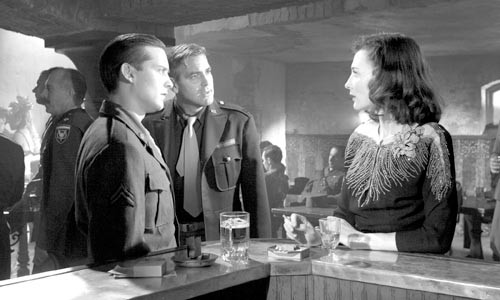Say what you will about Steven Soderbergh (and I have): At least he tries to turn celluloid into art. Usually he tries too hard (Kafka, Full Frontal), and sometimes he only pretends to try (Ocean's Eleven, Erin Brockovich). But he started out so well (sex, lies and videotape) that I've always kept hoping he'd do it again.
For a while, The Good German falls somewhere in the middle, until it slowly collapses into much less -- or at least no more -- than meets the eye. What's missing in The Good German is precisely what made us appreciate Soderbergh in the beginning: a sense of the authentic and the intimate, replaced for too long now by mere sophistication and iconography.
The story -- based on a novel by Joseph Kanon, and adapted by Paul Attanasio -- takes place in Berlin in July 1945, after the victorious allies have carved up the city, but before they've decided exactly who gets what of everything else the Germans collected during the war. That's what Truman, Churchill and Stalin plan to hammer out at Potsdam, around which the action of The Good German revolves.
Enter the hero, more or less: Capt. Jake Geismer (George Clooney), who ran the AP bureau in Berlin before the war, and who's now a correspondent for The New Republic, covering the Big Three. His driver, Cpl. Tully (Tobey Maguire), is a callow pup who -- like everyone else in Berlin, where everything and everyone is for sale -- wants his share of the post-war profits. He also wants an exit visa for his girlfriend, Lena Brandt (Cate Blanchett), who worked as a stringer for Jake before the war, and who was Jake's lover then as well.
But she is, as she puts it, a Jewess, and when the war began, she had to survive. She became a cheap whore, and then a high-priced one. And she married Emil Brandt, a mathematician who worked on his country's missile program until he died in a bombing raid. Or did he? That's what the Americans and the Russians want to know, and they're willing to kill to find him. Jake, meanwhile, wants only to get Lena safely out of Germany. So the intrigue begins, and soon, the secrets come slowly, slowly, slowly tumbling out.
In words, this all may sound vaguely familiar. But on film it's evidently The Third Man, Chinatown and, at the end, a touch of Casablanca on the tarmac (in the rain). Emil Brandt is our inverse Harry Lime, if not quite as tainted, and seeking redemption. As Lena, Blanchett channels Dietrich, Garbo and Valli. Clooney is our ersatz Holly Martins, rather less innocent, but still incapable of winning a fistfight.
Even the short-lived Maguire recalls Holly's jaunty driver in The Third Man, albeit with a dirtier mouth, and some fatal distractions. The borrowing is so obvious that someone essentially says, "Forget it, Jake. It's Berlin."
This would all be fine, if only there were more. In The Third Man and Chinatown, as in all good drama, character drives plot, and not vice versa. That's not true in The Good German, which is so intent on imitating classical film style that it pays no attention to the internal workings of the piece. The emotions here are worse than flat: They're hackneyed to the point of tedium, and they leave you feeling absolutely nothing.
Soderbergh tries to grip us now and then with little history lessons -- the Russians get Poland, we get the German rocket scientists -- and with reminders of the Holocaust. But all he finally does is prove Stalin's grim epitaph about genocide. The Good German draws its fleeting sensations from six million deaths when it needs to compel us with just one or two. The victims are ciphers here, and that's a shame, because Soderbergh does manage to film a ripping good climax for his unhappy first ending. Then there's more, and we're back to the clichés we saw coming three reels away.
The acting is sturdy, breathy and classical at times, but accented with a modern methodology. It's filmed in low-contrast black and white, so the light bleeds into the darkness, at times like the shimmering passages of Citizen Kane. Soderbergh uses visual wipes copiously to get from scene to scene, but then his camera follows people in and out of rooms in a more contemporary style. It's certainly a handsome film, the sort of thing calculated to please smart audiences with lowered expectations. 
Starts Fri., Feb. 9















